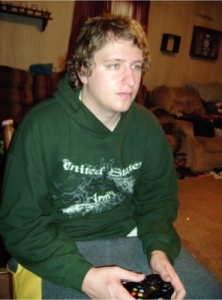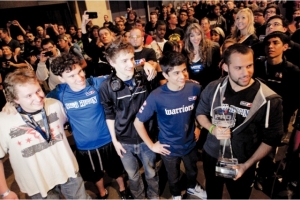When gaming becomes serious
By Ty Johnson
Published in News on December 30, 2012 1:50 AM

News-Argus/TY JOHNSON
Local professional gamer Kalvin Le Roy plays Halo 4 at home. Le Roy, 25, coached his team, Warriors, to a first-place finish at the Fall Championships in Dallas, Texas, where he and his teammates won $20,000 and were crowned the first-ever national champions of Halo two days before the game was released.

Submitted photo
Kalvin Le Roy, left, stands with his Warriors teammates after receiving the championship trophy at the Halo 4 pre-release tournament in Dallas Nov. 3. Pictured are Ryan "RyaNoob" Geddes, Tyler "Ninja" Blevins, Faisal "Goofy" Khan and Bryan "Legit" Rizzo.
Kalvin Le Roy drops to the ground and covers his face in his hands.
His teammate, still clutching his Xbox 360 controller, just delivered the winning kill in the first game of the Halo 4 Grand Finals in Dallas earlier this year, bringing his Warriors team one step closer to becoming the first-ever national champion of the game, two days before its release, and $20,000 richer.
The moment, and every one of them leading up to it, was captured entirely by cameras streaming live to thousands online as part of Major League Gaming's coverage of the Fall Championships, a weekend of tournaments that crowns champions in such games as Starcraft II, Tekken, Mortal Kombat and more.
A Goldsboro native, Le Roy, 25, and his team have skyrocketed to the top of video game stardom in a culture where professional gamers have cult followings and coverage of tournaments rivals ESPN's comprehensive approach of other sports.
Just a few years ago, Le Roy was one of those followers, but by the end of that day, he was bringing a shining, translucent trophy up to his lips for an obligatory and iconic photograph of him kissing the tournament's ultimate prize.
Today that photo is his profile picture on Twitter, where @KalvinMLG has nearly more than 850 followers and dozens of gamers petition him for coaching advice or to play a round on the Xbox Live network.
Le Roy has become a gaming legend in his own time -- the product of a mechanism that was set into motion when he offered to treat his friends with a trip to an MLG tournament in Texas just a few years ago.
*
Le Roy grew up with the first installment of the Halo franchise, a series of first-person shooter video games chronicling a futuristic interstellar war between humans and aliens, but he didn't start out as a superstar in the gaming world.
In fact, he came up playing local tournaments and idolizing the pro gamers he now rubs elbows with all the time.
In the mid-2000s, he and his friends prepped for multiplayer tournaments with LAN parties during which players would sometimes split themselves up into different rooms to help resist the urge for players to cheat by looking at what others are doing.
In the competitive gaming culture, screen-looking is serious, Le Roy said, but when he learned about Major League Gaming in 2005, he gained interest in the highest level of gaming, where that etiquette is enforced by strict rules and regulations.
He began watching competitions through MLG and was enamored with it, though he knew he truly wanted to be the one holding the controller.
"I said 'I want to go to one of these things," he said.
When he finally made it to Chicago for the MLG Central Conference Championships in 2005, he found himself surrounded by the players he had idolized through the screen.
"It made me feel like the biggest nerd," he said, noting that he recognized several of his favorite gamers.
He knew their statistics, strategies and tendencies in the same way baseball fanatics memorize on-base percentages and batting averages.
This is where he first began to realize that his passion was leading him down a path to becoming a gaming coach.
But just being there wasn't enough -- his dream was to play. And win.
His journey to the top took a detour through Iraq and Korea, however, when he joined the Army in 2006.
That proved to be a significant step toward his goal of joining the MLG Pro Circuit, however, as his return home in 2009 left him as a 22-year-old with some extra cash on hand.
After he paid for his essentials, he said he wanted to do something for his friends, so he treated them with a trip to the MLG championships in Dallas where they could all realize their dream of competing in a major tournament.
It didn't end well.
"We got absolutely slaughtered," Le Roy said, recalling his team's tournament-ending loss in the second round of the amateur loser's bracket. "It was kind of a wake-up call."
A second foray into the competitive gaming scene brought a slightly better result, but Le Roy found himself enjoying the people he met at the events almost as much as the competition itself.
"I'm a people person," he said, noting that his jobs, working at Waffle House and Brooklyn's Pizzeria, bring a lot of interaction with others.
He found that he had so much in common with other tournament folk that he began attending pro gaming tournaments and conventions just to take in the culture.
A return to spectating, he said, gave him a really good understanding of the game at a deeper level, but he still couldn't translate that into a win when his team finished poorly again in Raleigh in 2010.
But then a team offered a way for him to step back from the controller while still competing -- they asked him to coach them.
His first attempt at coaching led to a 33rd-place finish during a Halo: Reach, the tournament, but Le Roy felt he had found his calling.
He contacted a pro team ahead of the Dallas 2011 championships about coaching and was given a shot, although the 20th-place finish there was bittersweet since the team entered ranked 16th in the field.
Le Roy said the team members didn't really respect him since they had never been coached before, but his performance was enough to get noticed.
Another team, again seeded 16th, requested his services in advance of the Anaheim 2011 tournament and this time the team finished on par with their seeding.
Then he picked up with 10th-seeded Triggers Down, one of the more prolific team names in competitive Halo, and coached the team to a sixth-place finish at the 2011 event in Orlando, Fla.
"That was a big jump for me," he said.
Le Roy skipped a few events and moved back to Goldsboro after that placing, but began coaching Warriors, a team led by Faisal "Goofy" Khan, who left Triggers Down, and Bryan "Legit" Rizzo, who left Str8 Rippin, another Halo dynasty franchise.
After a fifth-place finish in Columbus, Ohio this March, however, twilight was setting on Halo: Reach as gamers eyed the November release of Halo 4.
As Microsoft aimed to get Halo 4 on the MLG pro circuit, Le Roy began his team's preparation to become the game's first champion.
*
Video game coaching, a niche calling not often recognized, is downplayed even within the gaming culture.
Most assume it's timing weapons drops -- calling out when ammunition respawns or an opponent drops a power weapon -- but Le Roy's players are adamant that his presence behind the screens is worth much more than that.
"Having a coach is more important than just weapons drops," Khan, better known as Goofy, said via Xbox Live.
In the heat of a tournament, needing to keep track of the score, time remaining and weapons available makes having a coach invaluable, he said.
"It's always good to know the atmosphere you're playing in," he said. "He always tells us what we need to know."
Le Roy also helps during match sessions online, playing together with his teammates -- scattered across the country -- and helping to put together strategies.
But how do you practice for a game that hasn't even been released yet?
"We watched a lot of videos," Le Roy said, adding that an IGN Entertainment article broke down the game in advance, analyzing every map and weapon in the game well before the tournament.
They practiced their basic communication and mechanics on Halo:Reach, winning every online match they played on the game engine the new Halo was based on, and by the time the festivities began it was clear their practice had paid off.
"It looked like we had already played the game," he said.
When the randomly seeded bracket was announced, Le Roy identified matchups and competitors to watch and the team went to work.
Le Roy instructed his teammates to utilize a new short-range weapon, the boltshot, when the opportunities arose -- one he felt other teams would ignore as they sought the sniper rifles and rocket launchers that had routinely been overpowered in previous Halo installments.
During the final game of the tournament, MLG broadcasters marveled at Rizzo's use with the boltshot, which had complemented the Warriors' mastery at the traditional power weapons throughout their tournament run -- one that included just one loss in 19 tries on the way toward claiming the championship with a final flag capture against Ambush, another storied Halo team.
Following the championship, Le Roy returned home to Goldsboro, where he was asked to play one-on-one with pre-order customers at GameStop during the store's launch party.
He still maintains close ties with his teammates, who are planning to compete in Chicago in January, and Le Roy has plans to play at the Carolina Games Summit tournament Feb. 2 at Wayne Community College, where he finished second last year.
